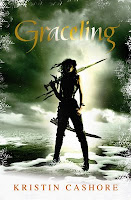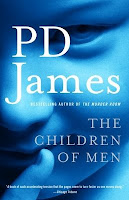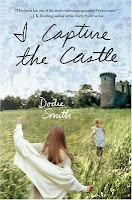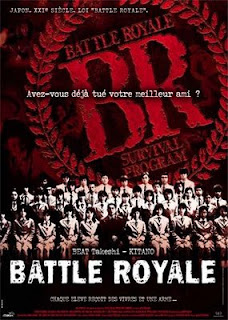 Neither of these films are new but I've either just watched or rewatched them and think they're really rather good, and they fit in with my dystopian challenge. Just.
Neither of these films are new but I've either just watched or rewatched them and think they're really rather good, and they fit in with my dystopian challenge. Just.The first is Deep Impact. You probably all saw this back in the day, but some of you younger ones might have missed it. It's a rather good asteroid apocalypse film, far better than the woeful Armageddon. Unfortunately, it's the latter that I paid good money at the cinema for. But even on the small screen Deep Impact holds its own because it has a story. I don't have a lot of patience for directors who stuff a load of special effects or beautiful shots into a film and expect that to be enough to make it fly. (Did you see Let the right one in, the Swedish vampire movie? Beautifully shot. Boring as hell.) I won't go into the plot here, but you get the idea: big thing hitting the Earth! Oh no, life as we knew it, etc etc. Not brilliant, but watchable. Watchable films are thin on the ground right now.
 The second film is Watchmen. I really should have seen this at the cinema when it came out but a) money and b) annoying crowds of people. I prefer watching films with my boyfriend so we can drink red wine and show off to each other how clever we are at interpreting plot points and character flaws. A far superior viewing experience. We both agreed that this film ROCKS, but gets a little shaky towards the end. The pacing goes a bit off in the last third, like it's not sure if it wants to end yet (a little like Baz Lurman's Australia, which really should have ended at several points but just kept going and making embarrassing historical errors.) It's beautifully shot and anally precise, and the opening scene (sort of the opening scene) at least is absolutely faithful to the comic book. (Better than Sin City, and I loved Sin City. Where the bloody hell is the sequel?)
The second film is Watchmen. I really should have seen this at the cinema when it came out but a) money and b) annoying crowds of people. I prefer watching films with my boyfriend so we can drink red wine and show off to each other how clever we are at interpreting plot points and character flaws. A far superior viewing experience. We both agreed that this film ROCKS, but gets a little shaky towards the end. The pacing goes a bit off in the last third, like it's not sure if it wants to end yet (a little like Baz Lurman's Australia, which really should have ended at several points but just kept going and making embarrassing historical errors.) It's beautifully shot and anally precise, and the opening scene (sort of the opening scene) at least is absolutely faithful to the comic book. (Better than Sin City, and I loved Sin City. Where the bloody hell is the sequel?) I'm also in love with Dr Manhattan. That's him on the left. Three of him in fact. I wish my boyfriend glowed blue and floated around in the nuddy and could make me relive my worst memories in minute detail. He's just so freaking cool and tortured. He can never have a proper human relationship which makes the zealous healing female in me sit up and say "I'LL FIX HIM!" The bit where Mr Physics Nerd realises (on Mars, no less) how awesome biology is and falls right out of his ivory tower has to be one of the best scenes in the whole film. He's also sculpted like a Greek statue, except in one area that the Greeks would never have made so, ahem, eye-catching.
I'm also in love with Dr Manhattan. That's him on the left. Three of him in fact. I wish my boyfriend glowed blue and floated around in the nuddy and could make me relive my worst memories in minute detail. He's just so freaking cool and tortured. He can never have a proper human relationship which makes the zealous healing female in me sit up and say "I'LL FIX HIM!" The bit where Mr Physics Nerd realises (on Mars, no less) how awesome biology is and falls right out of his ivory tower has to be one of the best scenes in the whole film. He's also sculpted like a Greek statue, except in one area that the Greeks would never have made so, ahem, eye-catching.Oh yeah and there's the threat of nuclear apocalypse and a superhero utopia gone wrong. Dystopian? TICK!




















